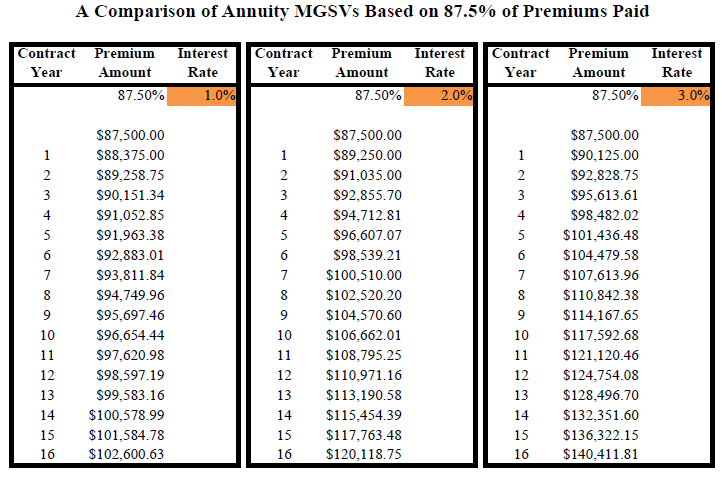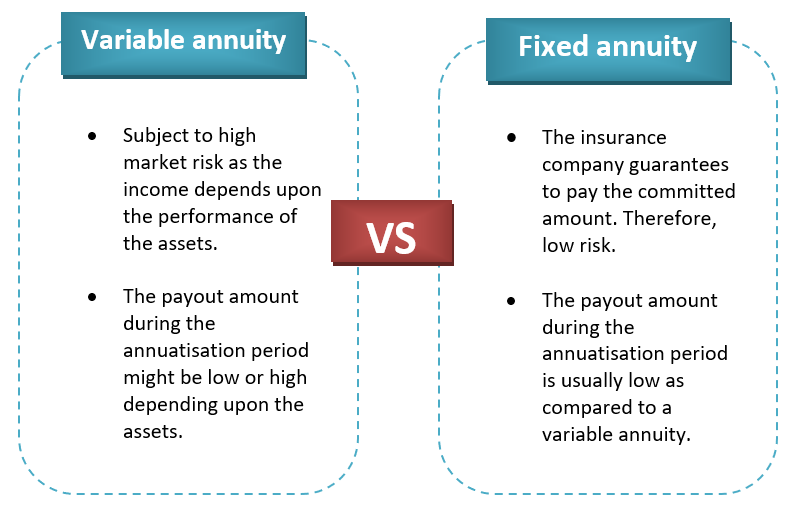All Categories
Featured
Table of Contents
Settlements can be paid monthly, quarterly, annually, or semi-annually for a surefire period of time or forever, whichever is specified in the contract. Just the passion part of each repayment is thought about gross income. The remainder is considered a return of principal and is free of revenue taxes. With a deferred annuity, you make normal costs settlements to an insurance business over a period of time and enable the funds to develop and make interest throughout the accumulation phase.
This suggests an annuity may help you build up much more over the long-term than a taxable financial investment. Any kind of earnings are not taxed till they are taken out, at which time they are thought about average revenue. A variable annuity is a contract that offers changing (variable) instead of set returns. The essential attribute of a variable annuity is that you can control how your costs are spent by the insurance coverage company.
A lot of variable annuity agreements offer a range of properly taken care of portfolios called subaccounts (or investment choices) that spend in stocks, bonds, and money market instruments, in addition to well balanced financial investments. Some of your contributions can be put in an account that provides a set rate of return. Your costs will be allocated among the subaccounts that you choose.
These subaccounts rise and fall in value with market conditions, and the principal may deserve a lot more or less than the original price when surrendered. Variable annuities offer the twin advantages of financial investment adaptability and the potential for tax obligation deferral. The taxes on all interest, rewards, and capital gains are postponed till withdrawals are made.
Understanding Fixed Annuity Vs Equity-linked Variable Annuity Key Insights on Your Financial Future What Is Choosing Between Fixed Annuity And Variable Annuity? Pros and Cons of Various Financial Options Why Choosing the Right Financial Strategy Can Impact Your Future How to Compare Different Investment Plans: Explained in Detail Key Differences Between Different Financial Strategies Understanding the Risks of Long-Term Investments Who Should Consider Strategic Financial Planning? Tips for Choosing the Best Investment Strategy FAQs About Pros And Cons Of Fixed Annuity And Variable Annuity Common Mistakes to Avoid When Choosing Fixed Annuity Vs Variable Annuity Financial Planning Simplified: Understanding Your Options A Beginner’s Guide to Smart Investment Decisions A Closer Look at How to Build a Retirement Plan
The program, which includes this and various other information regarding the variable annuity agreement and the underlying investment options, can be acquired from your financial professional. Be sure to read the prospectus thoroughly before choosing whether to spend. The information in this newsletter is not meant as tax obligation, legal, investment, or retired life guidance or recommendations, and it might not be counted on for the function of avoiding any type of federal tax charges.

2025 Broadridge Financial Solutions, Inc.
Two of the most typical alternatives include repaired and variable annuities. The major distinction between a fixed and a variable annuity is that fixed annuities have a set rate and aren't linked to market efficiency, whereas with variable annuities, your ultimate payment depends on exactly how your picked investments perform.
You can pick just how much money you want to add to the annuity and when you intend to start obtaining revenue payments. Usually talking, repaired annuities are a foreseeable, low-risk way to supplement your revenue stream. You can money your repaired annuity with one round figure, or a series of payments.

You can money a taken care of or variable annuity with either a lump amount, or in installations over time. Most of the time, variable annuities have longer build-up durations than repaired annuities.
Highlighting the Key Features of Long-Term Investments Key Insights on Your Financial Future Defining Fixed Annuity Vs Variable Annuity Benefits of Choosing the Right Financial Plan Why Variable Vs Fixed Annuity Can Impact Your Future Choosing Between Fixed Annuity And Variable Annuity: Simplified Key Differences Between Different Financial Strategies Understanding the Risks of Long-Term Investments Who Should Consider Strategic Financial Planning? Tips for Choosing Fixed Index Annuity Vs Variable Annuities FAQs About Planning Your Financial Future Common Mistakes to Avoid When Planning Your Retirement Financial Planning Simplified: Understanding Your Options A Beginner’s Guide to Smart Investment Decisions A Closer Look at How to Build a Retirement Plan
Both dealt with and variable annuities give you the chance to go into the annuitization phase, which is when you receive cash from your annuity. With repaired annuities, you'll obtain revenue in dealt with installations that are ensured to remain the exact same.
This can be 10 years, 20 years, or for life. The surrender period is the time frame throughout which you can not take out funds from your annuity without paying added fees. Surrender durations usually apply to simply postponed annuities so they can relate to both taken care of delayed annuities and variable annuities.
Living advantages affect the income you get while you're still active. As an example, you may desire to add an ensured minimum build-up value (GMAB) rider to a variable annuity to guarantee you will not lose cash if your investments underperform. Or, you may desire to include a cost of living modification (SODA) biker to a fixed annuity to help your settlement amount stay up to date with inflation.
If you wish to start obtaining revenue repayments within the next 12 months, an immediate fixed annuity would likely make more sense for you than a variable annuity. You could think about a variable annuity if you have more of a tolerance for threat, and you wish to be a lot more hands-on with your investment selection.
Among these differences is that a variable annuity may provide payout for a life time while mutual funds might be depleted by withdrawals on the account. An additional crucial difference is that variable annuities have insurance-related expenses and common funds do not. With every one of the significant and minor distinctions in taken care of annuities, variable annuities, and mutual funds, it is essential to talk to your monetary advisor to make sure that you are making smart cash choices.
In a taken care of annuity, the insurer assures the principal and a minimum price of rate of interest. To put it simply, as long as the insurer is financially sound, the cash you have actually in a repaired annuity will certainly grow and will not drop in worth. The growth of the annuity's value and/or the benefits paid may be fixed at a buck amount or by an interest price, or they might grow by a specified formula.
Understanding Annuities Fixed Vs Variable A Comprehensive Guide to Investment Choices Defining Variable Annuities Vs Fixed Annuities Advantages and Disadvantages of Fixed Vs Variable Annuity Pros Cons Why Fixed Annuity Vs Equity-linked Variable Annuity Is Worth Considering How to Compare Different Investment Plans: A Complete Overview Key Differences Between Different Financial Strategies Understanding the Risks of Long-Term Investments Who Should Consider Annuities Variable Vs Fixed? Tips for Choosing Fixed Income Annuity Vs Variable Annuity FAQs About Planning Your Financial Future Common Mistakes to Avoid When Choosing a Financial Strategy Financial Planning Simplified: Understanding Your Options A Beginner’s Guide to Fixed Vs Variable Annuity Pros Cons A Closer Look at How to Build a Retirement Plan
A lot of variable annuities are structured to provide investors many various fund alternatives. An equity-indexed annuity is a kind of repaired annuity, but looks like a crossbreed.
This withdrawal versatility is achieved by adjusting the annuity's worth, up or down, to mirror the adjustment in the rate of interest "market" (that is, the basic degree of rate of interest) from the beginning of the picked time period to the moment of withdrawal. Every one of the following kinds of annuities are readily available in fixed or variable kinds.
The payout may be a long time; postponed annuities for retirement can remain in the deferred phase for years. An immediate annuity is designed to pay a revenue one time-period after the immediate annuity is bought. The moment period relies on how often the income is to be paid.
Highlighting the Key Features of Long-Term Investments Key Insights on Your Financial Future Defining the Right Financial Strategy Advantages and Disadvantages of Different Retirement Plans Why Choosing the Right Financial Strategy Is a Smart Choice How to Compare Different Investment Plans: A Complete Overview Key Differences Between Fixed Interest Annuity Vs Variable Investment Annuity Understanding the Key Features of Fixed Vs Variable Annuity Pros Cons Who Should Consider Strategic Financial Planning? Tips for Choosing Fixed Interest Annuity Vs Variable Investment Annuity FAQs About Variable Annuity Vs Fixed Indexed Annuity Common Mistakes to Avoid When Planning Your Retirement Financial Planning Simplified: Understanding Variable Vs Fixed Annuities A Beginner’s Guide to Fixed Vs Variable Annuity A Closer Look at How to Build a Retirement Plan
A set duration annuity pays a revenue for a specific amount of time, such as 10 years. The quantity that is paid does not depend on the age (or continued life) of the person who buys the annuity; the payments depend rather on the amount paid into the annuity, the length of the payout duration, and (if it's a fixed annuity) a passion price that the insurer believes it can support for the length of the pay-out period.
A variation of life time annuities proceeds revenue until the 2nd a couple of annuitants passes away. No other sort of monetary item can assure to do this. The amount that is paid relies on the age of the annuitant (or ages, if it's a two-life annuity), the amount paid into the annuity, and (if it's a fixed annuity) a rates of interest that the insurance coverage business believes it can support for the size of the anticipated pay-out duration.
Several annuity buyers are uncomfortable at this opportunity, so they include a guaranteed periodessentially a fixed duration annuityto their lifetime annuity. With this combination, if you die before the set duration ends, the revenue remains to your beneficiaries till completion of that duration. A competent annuity is one used to spend and disburse money in a tax-favored retirement strategy, such as an individual retirement account or Keogh plan or plans regulated by Internal Income Code areas, 401(k), 403(b), or 457.
Table of Contents
Latest Posts
Analyzing Strategic Retirement Planning Everything You Need to Know About Financial Strategies What Is the Best Retirement Option? Pros and Cons of Annuities Variable Vs Fixed Why Choosing the Right F
Exploring Variable Annuity Vs Fixed Indexed Annuity Key Insights on Your Financial Future What Is Variable Annuities Vs Fixed Annuities? Advantages and Disadvantages of Different Retirement Plans Why
Understanding Tax Benefits Of Fixed Vs Variable Annuities A Closer Look at Annuities Fixed Vs Variable Defining the Right Financial Strategy Benefits of Choosing the Right Financial Plan Why Variable
More
Latest Posts